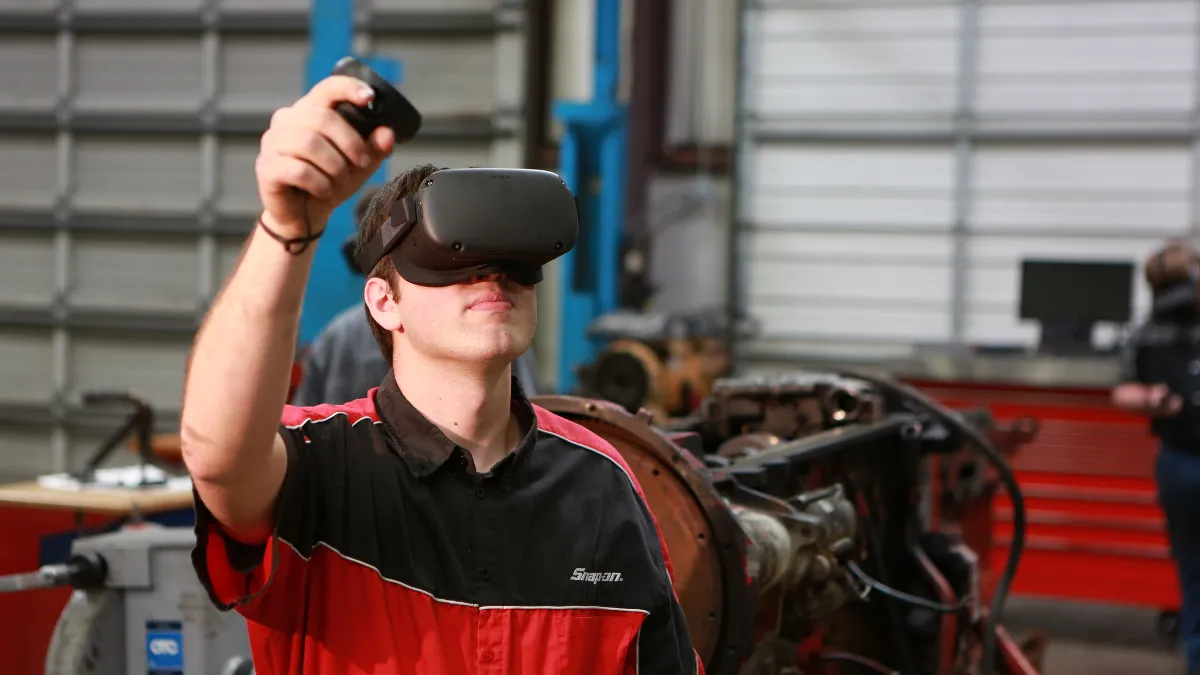Dive Brief:
- Wallace State Community College in Hanceville, Alabama, launched a diesel technology program that students can participate in remotely. Diesel by Distance began in a limited capacity last fall and has scaled up to include virtual reality technology, a Wallace State spokesperson said via email.
- "It was the desire of the Alabama Trucking Association for Wallace State to build a program that could reach any trainee in any area of Alabama," the spokesperson wrote. The association also provides scholarships, and helps recruit industry partners and sponsors to employ students during the program and after completion.
- "At a time when the need for skilled diesel techs is growing, the Diesel by Distance program will create the pipeline of well-qualified talent that our industry needs," Mark Colson, president and CEO of the Alabama Trucking Association, said in a press release Wednesday. "The use of VR has brought the real-world experience of diesel tech into the classroom, ensuring students can be ready to get to work on day one."
Dive Insight:
Trucking will need to recruit up 200,000 diesel technicians over the next decade to ease the labor shortage, to keep up with advances in equipment, changing industry standards and the retiring workforce, Wallace State said, citing a white paper by Landair.
The shortage is causing increased downtime, driver dissatisfaction and customer-service problems, the white paper states. And training programs in the U.S. are only graduating some 3,500 each year.
Panelists at the college's Diesel by Distance launch event Wednesday said VR technology, and the flexibility the program provides, will cater to the new generation of diesel technicians.
"In some more rural communities, it's very difficult to find instructors because they're working in the field," Colson said during the event, pointing to one of the benefits of an online course. "And the technology's [going to] sell itself, because everyone's used to looking at their phones. ... The generation we're training today needs technology."
Students in the program are issued Oculus VR headsets upon enrollment, the spokesperson said via email. The simulations, developed by Transfr, allow students to gain skills on the construction, manufacture, repair and maintenance of diesel-engine vehicles, according to the press release.
The use of VR technology won't replace the real-world experience needed to pass the course, Jeremy Smith, the college's Diesel Technology program chairperson, said during the event. VR helps lessen the learning curve involved with becoming a technician and allows the students to enter the workforce with more skill, he said.
VR is also being used in other areas of the trucking industry. UPS began using it in 2017 as part of its safe driver training.
"We all struggle with distractions that stall our engagement," UPS Director of Learning Technology Jon Bowers said last month. "The VR arena makes that next to impossible. You have to concentrate on what you’re seeing and hearing."
Colson and Smith said they anticipate the injection of new technology will enable students to reshape the reputation diesel technicians have long been bogged down by, once they enter the workforce.
"The perception that we've always had ... we've always been called a 'grease monkey.' It's always been a negative," Smith said.
VR can be part of that, Colson said. Once employed, those who have been through the Diesel by Distance program might be able to teach their veteran colleagues a thing or two and help push the team forward.
Wallace State works closely with the industry, with help from Colson's group. Partners include Truckworx Kenworth, Penske, R.E. Garrison Trucking and MyWay Transportation. The Diesel Technology curriculum can be customized to fit partners' hiring needs. For example, Smith developed NC3 customized training for partner Kubota, which Wallace State now offers.












